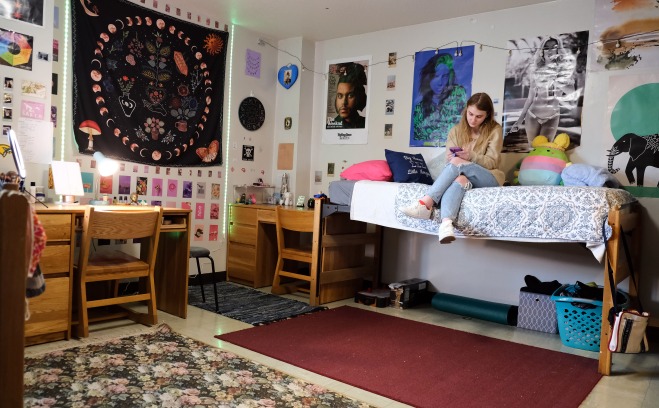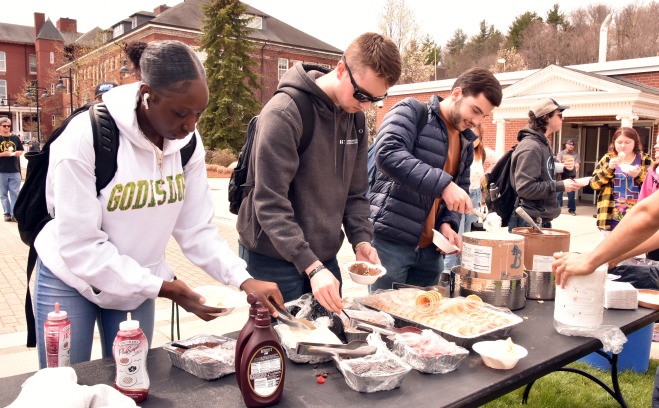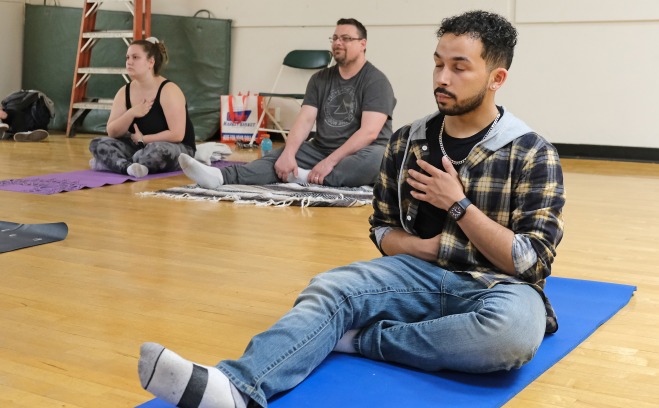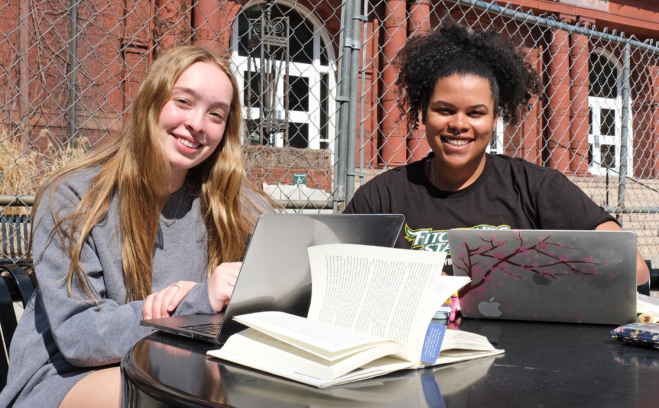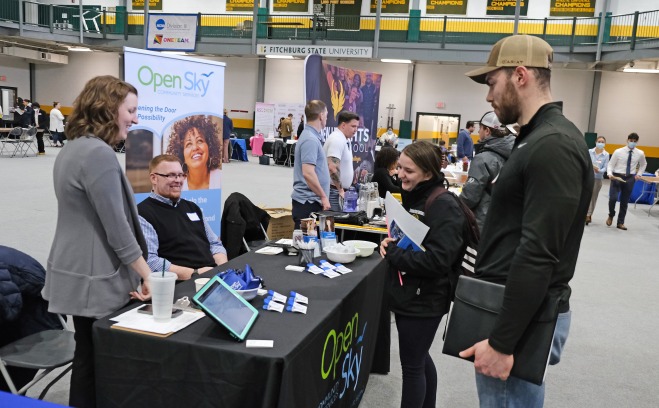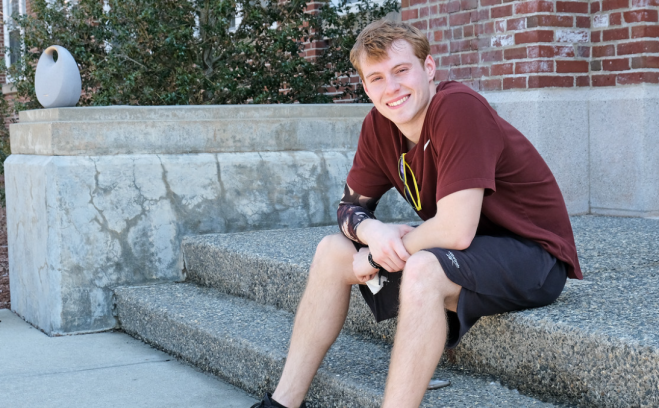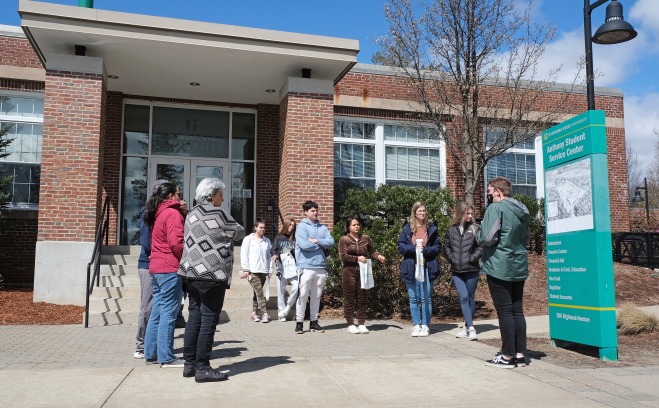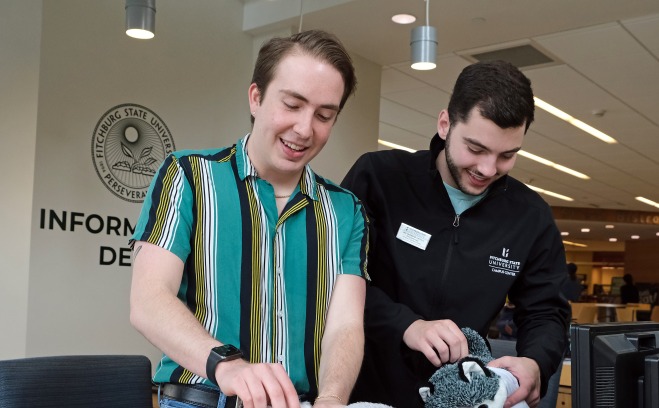
All of us at Fitchburg State are committed to creating an environment where your student will thrive.
The college transition can be a thrilling but emotional time, both for your student and for yourselves. We know what you are experiencing, and we are here for all of you. This page contains resources for you and your student as you make this transition, along with answers to your questions about what happens next.
Together, we will help your Falcon soar.
Family and Friends Summer Orientation
At Fitchburg State, we understand that the transition is not just for the student, but for their supporters as well. Therefore, we offer a two-day family and friend orientation program parallel to the student program. These sessions allow family and friends to speak with administrators regarding academic support services, student engagement, and campus safety. These are the same as the student program and are as follows:
- Session One: Monday, June 9 - Tuesday, June 10, 2025
- Session Two: Thursday, June 12 - Friday, June 13, 2025
- Session Three: Monday, June 16 - Tuesday, June 17, 2025
- Schedule: TBD
Students will sign up for family and friends via the student admissions portal. Housing and Residential Services has designed the Falcon Night Stay program. This allows supporters of students to stay on campus for a flat rate.
From Your Nest to Ours
The life of a college student is different from that of a high schooler. Here are some things to know.
Living On Campus
We want to help you find your fit and strengthen your sense of belonging on campus, by cultivating an environment that facilitates the “adulting” process of living on your own.
Commuting Students
Did you know that half of our students commute to campus each day? We provide a number of services and programs to help our commuters participate in campus activities and feel more connected to Fitchburg State.
Go Falcons!
Keep up with our athletic teams and learn about student athletics on the Falcons website.
Hitting the Books
College classes will pose new challenges for students. These resources will help your student learn how to adapt to new expectations.
Support Services
We recognize that our students are more than just their enrollment status and grade-point-average. Students are people, with individual goals, needs, concerns, and challenges. Learn how we can help students identify and cope with those challenges.
Building Better Study Habits
At our Academic Coaching and Tutoring Center, we're committed to helping each of our students achieve success.
Turning Your Degree into a Career
Our Career Services and Advising Center is here whether you're looking to declare a major or do some career exploration.
Making Ends Meet
We are committed to keeping a college degree within reach for all students. Learn about what help is available.
Need Help Paying a Bill?
The Office of Financial Aid helps connect students with support to pay for their educational expenses.
Where Do I Pay?
The Office of Student Accounts is responsible for the billing and collecting of all tuition and fees, issuing refunds to students for credit balances, and the collection of Perkins and nursing loans.
Need a Job on Campus?
Many students have part-time jobs on campus. We offer a variety of positions, either as part of a student's financial aid package or as hourly university employees.
Debunking Myths About College Life
We know there are a lot of misconceptions about what to expect in college. Here are a few we can dispel right now.
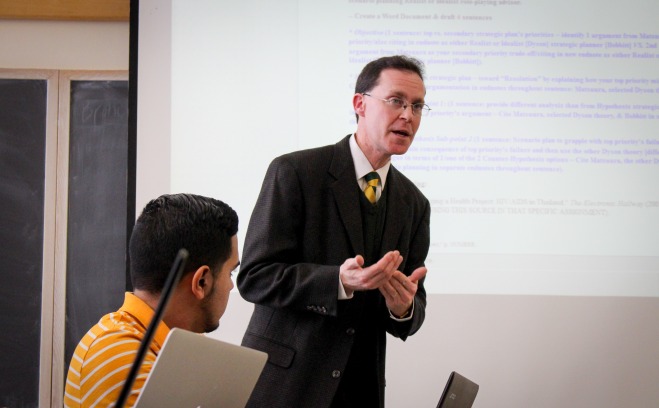
Myth: Professors Aren't Approachable
FACT: Every student is assigned a faculty advisor who is committed to supporting their success, as are all of us at Fitchburg State. STUDENT TIP: Make sure your student is aware of faculty office hours, which are great opportunities to check in.
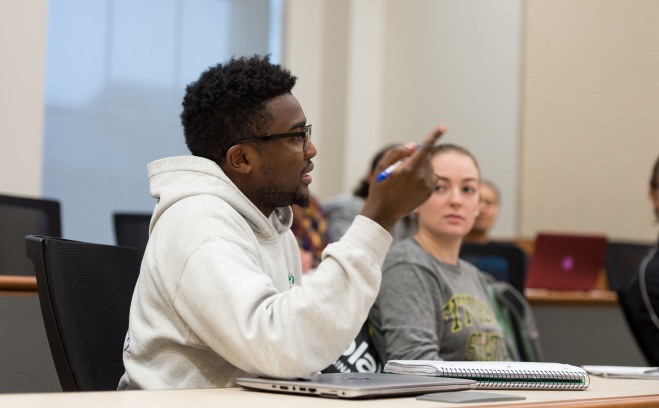
Myth: You Don't Actually Have To Go To Class
FACT: While college classes don't typically involve taking attendance like in high school, you will absolutely get more out of your coursework by taking advantage of in-class time with our professors and your fellow students. STUDENT TIP: Our tutoring and advising centers can help students improve their time management skills so they can keep on top of their schedules.
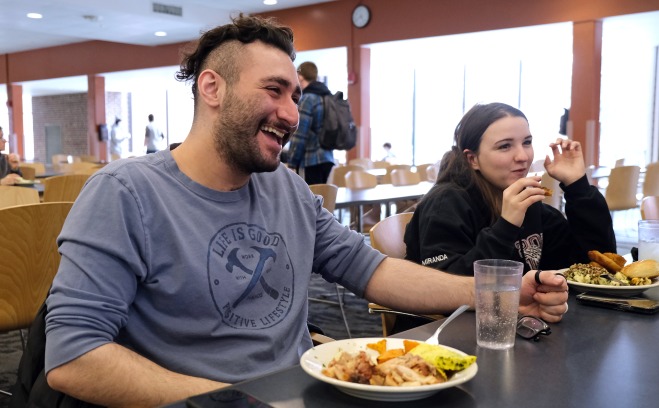
Myth: If You Don't Make Friends Your First Week, It's Too Late
FACT: While there certainly are students who strike up lifetime friendships with their first-semester roommates and residence hall neighbors, you will be meeting people and making friends throughout your experience on campus. STUDENT TIP: Getting involved with clubs and organizations is a great way to make connections with new people.
Homesickness and Supporting Your Student
In general, parents and friends should be encouraged to:
- Acknowledge transition and encourage positivity
- Be proactive and stay connected
- Encourage participation and model resilience
Below are some additional tips and resources to help you and your student.
Prepare for this transition early. This can help students orient themselves and become familiar with their surroundings. Preparation for college can also come in the form of emotional preparation, such as talking about the possibility of homesickness beforehand, and how students and parents can work together when feelings of homesickness occur.
Parents can help by being positive about the college experience, and everything that can be gained by this important step into young adulthood. Expressing and focusing on the positive parts about the college experience will allow first-year students to go into the experience with more optimism as well.
When your student experiences periods of homesickness or loneliness, it may feel very tempting to suggest that they come home. Instead, one of the best things family and friends can do is encourage your student to become more involved in their campus community. This will help promote a sense of belonging for your student.
Adjusting to the new opportunities and challenges of college life takes time. Students may go through periods of depression, loneliness, stress, or frustration. Families and friends should be encouraged to be patient and STAY POSITIVE.
We understand that this may be a challenging transition for parents and families as well, but it may be best for your student to remain positive in your interactions. Simply acknowledge their feelings and listen to them.
Our hope is that your student is making acquaintances and becoming increasingly engaged over time. This is likely a signal of a positive transition. While you know your student best and will respond accordingly, “no news is good news” may be a healthy motto to adopt!
Sometimes our students just need to know that there’s a supportive listener on the other end of the phone. Asking questions shows that you are listening and that you care, and answering questions can help your student clarify their own thoughts and emotions.
In extreme cases of homesickness, families might consider setting up a schedule for students to come home - for example, once a month or twice before winter break. Knowing this is on the calendar can alleviate homesickness for some students.
Fitchburg State wants your student to feel proud of their new home. We encourage you to schedule a visit with your student, as this will also give them (and you) something to look forward to.
Parents and friends can set up a regular day and time to call, and should be encouraged to send emails, letters, or postcards. Parents can send newspaper articles from the local paper or food packages to help the student feel less isolated.
It will be comforting for your student to know that you are thinking about them, while encouraging them to get involved in the community. You may want to send fun, shareable things, like a big bag of popcorn or homemade cookies. Encourage your student to offer goodies to roommates and others in the residence hall. It’s unlikely anyone will turn down the offer of a home-baked treat, and it’s a good way to break the ice!
Tell them to be open to conversation wherever they go, from lecture halls to coffee shops. It’s hard to get the hang of meeting new people, especially if they have grown up in the same town and known the same people all their life, but putting themselves out there is the only way to connect with others.
Parents should be encouraged to check out their college’s website and keep informed about events happening on campus and important academic dates. This can help families and friends better understand campus life and the resources and opportunities available on campus.
Volunteering, if you have time, is a great way to build esteem and establish a sense of belonging. Whether it’s working with animals, caring for children, or visiting senior citizens in assisted living to brighten their day, giving back to the community can help a lot. Make sure your student is aware of Fitchburg State’s Volunteer Center.
If homesickness and unhappiness persist, talk with your student about on-campus counseling. These services are at no additional cost to your student and will help them navigate their transition and contribute to overall wellness during their time in college.
Frequently Asked Questions
Orientation is included in your tuition and fees. There is no separate charge.
An important part of residence hall life is living with a roommate. If someone has never shared a room before, it can be an adjustment. We encourage you roommates to sit down with their resident assistant (RA) the very first week of school and complete a "Roommate Agreement." This is a form that helps outline guidelines and expectations for sharing space. Doing this early will help avoid conflict between roommates.
If issues arise, don't let them go unaddressed. This will only make matters worse. The RA can help if conflicts can't be resolved. RAs are trained in conflict mediation and can help define what the issues are and help roommates come to a resolution. The area director and assistant hall directors (AHDs) are also available to help with roommate conflicts. If the difficulties cannot be reconciled between the roommates, and mediation is unsuccessful one or both roommates may be moved to another room or hall.
The Financial Aid Office is located in the Anthony Student Service Center in the center of campus. The office offers in-person and virtual meetings with students, families and anyone who has questions related to financing their education
Office Hours: Monday-Friday: 8 a.m. to 5 p.m.
Phone: 978.665.3156
There is not a physical bank on campus, however we do have an ATM located in the G-lobby in Hammond Hall, managed by Enterprise Bank. We also have several full service banks located not far from campus.
If your student becomes sick or injured while away at school, Fitchburg State University has partnered with Community Health Connections (CHC), a highly respected, federally qualified health center that has two locations very close to our campus, to provide services to the campus community. Many of our students and employees already use one of their four locations in our area.
All undergraduate and graduate students taking one or more credit hours at Fitchburg State are eligible to receive services. Learn more here: https://www.fitchburgstate.edu/student-support/health-and-wellness/student-access-health-care.
The Counseling Services Office located on campus provides counseling services to all registered students at Fitchburg State. The counselors provide confidential, culturally sensitive support dealing with the variety of personal concerns students may have. Students may schedule appointments with a counselor by calling 978.665.3152, or by sending an email to counselingscheduler@fitchburgstate.edu.
At Fitchburg State, we care for our students' overall well-being. We want to help them get the care, referrals, and answers they need to ensure their success. In many cases, your student may be hesitant regarding seeking professional help. They may need to know that you don't see them as a failure or as weak for doing so. If you have decided to recommend to your student that they seek our services (or other professional mental health services), be prepared to give specific information:
- In the case of Fitchburg State Counseling Services, for enrolled students, there is no cost.
- The office is located in the third floor of Hammond Hall.Location (Hammond Building, Third Floor)
- Students may make an appointment by 978.665.3152, or stopping by the office.
In accordance with federal privacy laws, the university is not at liberty to release students’ grades to parents or other individuals without documented consent on the part of the student. For more information about the Family Educational Rights and Privacy Act (FERPA), visit the U.S. Department of Education's website.
Proxy access allows students to designate an individual to view information about the academic records. More information about proxy access can be found online in our privacy policy.
Here at Fitchburg State we have more than 85 clubs and organizations with which to get involved. At the beginning of each semester there is an involvement fair, which is a great opportunity for your student to get information on organizations.
If we do not have a student organization that interests your student, they can create their own by contacting the Office of Student Development.
Yes, for students living on campus and off. More information about meal plans is available from our campus dining services. Find more information on each specific meal plan on our Dining Services page.
Free shuttle service is provided around campus and the downtown area; students need only their student ID when boarding. Bus service is free for all Fitchburg State students. Buses run every day except Sundays. Information on the bus service can be viewed online.
The Office of Disability Services is located on the third floor of Hammond Hall. Their office provides resources to help students get the accommodations they need here on campus to be successful. It's important to note that accommodations do not automatically transfer from a previous institution to Fitchburg State. Students are responsible for registering with Disability Services prior to needing accommodations, preferably before they start classes. The office is open 12 months out of the year to best assist students.
The Academic Coaching and Tutoring Center is located on the third floor of Hammond Hall. Students may sign up for a tutor for a specific subject or class, a writing tutor, or an academic coach. Tutoring is free of charge to all students, and may be accessed in-person or online.
Our on campus dining service is mindful of common dietary restrictions when planning their menus. For specific concerns, contact them directly, or students can speak with the chef in their dining area. Learn more on the dining services page.
Yes. Fitchburg State is home to a full-time, professional police department. It is the mission of the Fitchburg State University Police Department to reduce the incidence and fear of crime, to partner with the community to solve problems, to enhance public safety in a manner that is reasonable, unbiased, and transparent, to support students in their development and academic endeavors, and to be a collaborative resource for faculty, staff, and students.
The University Police Department is fully staffed with officers and dispatchers in the 911 center, and full-time civilians. The Police Department is available 24/7 and provides all law enforcement services to the campus community, including:
- Rave Alerts – an emergency text message system to keep students and their families informed
- Rave Guardian for your student – an easy access emergency services app for their cell phone
- RAD Program – The Rape Aggression defense program is a free twelve-hour class to empower women
- Alcohol and Drug Abuse Prevention Programs
The Office of Parking Services is in charge of providing parking passes, with the type of permits available dependent on a driver's affiliation with the university. Learn more on the parking services website.
Fitchburg State University students have access to many scholarships to make college more affordable. Our commitment to making a Fitchburg State education affordable is evident in our annual cost—among the lowest in the state university system for full-time residential students. Learn more on our tuition and fees page.
What To Expect When You're Expecting Your Student Home for Winter Break
Having your student home after being on their own for several months requires some adjustments. Below, Fitchburg State students Isabella McCutcheon '25 and Meghan Russo '26 share some insights.
A big change from home life to college is the students' sleep schedule. Because college is such a massive transition for first year college students, sleep can fluctuate. Expect students to sleep a lot more than they would before. This is their first time in a few months that they can rest and catch up on lack of sleep, especially after finals week. They also will be very happy with getting to sleep in their at home bed, which has a high probability of being much more comfortable than their dorm bed. But hey, that's what mattress toppers are for…
As nice as it is to choose your own meals in college, something about meals from home is much more appealing. Even if your student likes the options provided at college, eating similar things for months straight can make anyone bored. It is guaranteed that your student will have a greater appreciation for home cooked meals when they are on break from college. It is nice to know that it is catered specifically towards them, not just towards the entire university.
Like said above, students are expected to sleep a lot more on break from college. But it is also important to note that a college student's curfew is fair game. Especially living in a dorm, students have full access to seeing their friends at any hour of the day, even at 3 a.m. Some stay up studying (the library closes at 11 p.m.!). Others may stay up just to hang out with friends. So students become accustomed to choosing what time they go to bed, whether early or late.
Having lived at college for roughly four months now, students are going to need a little time to adjust back to home life. They have found themselves in their college routine, which can be very different from the at home routine. From going to the dining hall for meals, to studying for hours on end in the library, to living in a dorm, going back to living at home will take some adjustment. For some students the transition may be smooth, but it may take more time for others depending on the student.
Fitchburg State University is known to have many first-generation college students. If this is the case, parents/guardians of the student are going to have many questions. It is totally understandable to have a million questions racing around your head, especially if you are someone who has never experienced college yourself. While it might be intimidating hearing about all of this new lingo, classes, and college life in general, it is something that just takes time to adjust to. To help familiarize yourself with campus culture, take advantage of the many different Fitchburg State websites available describing what’s going on on campus.
This one is less something to expect from your child, and more something to fear. More likely than not, your child will probably tow home a hamper bursting at the seams with dirty socks and sweaty gym clothes. Since you typically have to pay for the washer and dryer at school, a lot of kids will take advantage of the opportunity to get some laundry done for free over the holidays. Although this may be a bit inconveniencing at times, try and be patient. Access to a personal washer and dryer feels like a luxury when you haven’t had it in a while.
After a long, stressful semester followed by the anguish of final exams and term papers, it is not absurd for students to feel like they never want to answer a school-related question again. With that said, of course it’s understandable to be interested in what school life has been like. Try and let your student settle in for a couple of days, adjust to being back in the household again, then ease into questions related to academics.
With the Spring semester right around the corner, a great segue into a conversation like this could be asking if they have registered for spring classes. This way, you can learn more about what is upcoming for your student, while also opening the door for them to tell you more about their academic life in general.
As everyone comes home for the holidays, for students with lots of friends or extended family, it can feel as though you have a to-do list of people to reconnect with. You have to make sure you do everything from see your grandparents, stop by your old job, visit your little cousins, and of course spare some time to hang out with your old buddies. With this said, don’t be offended if your student spends a lot of the break out of the house.
Although the break may seem long, it goes by quickly. There is a lot to cram into just a few weeks, so be mindful of the fact they are most likely just trying to squeeze everything they can in. Perhaps a good approach to spending time with your student is to ask them their schedule for the week ahead of time, that way each of you can carve out a specific time to have quality time.
After spending the last few months confined to the space of a dorm, the thought of being able to spread out all of your belongings and be somewhere more spacious for a month sounds like a dream. With that said, it most likely will not be a dream for you when our bedrooms are destroyed one week after getting back and for some reason our clothes are all over the house.
Although we will try our best to be tidy, be patient with us. After a long semester of missing home and working hard in our classes, right now we just want to spend some time vegging out.
It may be time to discuss with students a few key points. The point of attending college is to further one's education in hopes of gaining a career. It is never too early to start a discussion with your student about what their hopes and goals are for the future. Some are already goal oriented and know their future plans. Listen and support them with their ideas. Others are still in the process of figuring it out. Regardless, having a talk with your student is a productive conversation starter to see where their mindset is.
Making the Most of Spring Break
By Meghan Russo '26
With Spring Break quickly approaching (March 4-12), students may be wondering what to do on their week off. Not everyone is able to go on a luxurious trip to somewhere tropical, but there are plenty of meaningful options.
The first option is to enjoy time with family and friends. Spring break is a great opportunity to take a week off from studies and enjoy quality time with loved ones. Appreciate the small things, like getting home cooked meals or getting to sleep in your at home bed. The little things can be a luxury when away from home at college.
Other choices include the university’s Alternative Spring Break program. This month, Dean of Students Hank Parkinson will be bringing 13 students to Puerto Rico for the university’s Alternative Spring Break program.
“We will be volunteering at two camps, Camp Tabonuco and Carite 3.0, both focused on sustainable farming,” Parkinson said. “We will be in the mountains with limited amenities while living in community with the locals.”
Participants raise funds to defer the cost of making the trip, which will be Fitchburg State’s first ASB voyage in three years following disruptions from the pandemic.
The university also offers academically focused study abroad opportunities. Assistant Director of Study Abroad Nicole Salerno said this semester’s options include a trip to Milan, Italy, for students in a luxury brand management course, as well as a voyage to the Heart of Europe, featuring stops in the Netherlands, Germany and Poland.
The study abroad program at Fitchburg State works with financial aid in order to make these trips affordable for all students, Salerno said, with 90% of the students traveling to Italy receiving a scholarship. Faculty-led programs are planned out years in advance, so students are encouraged to start looking into the programs as soon as possible.
